
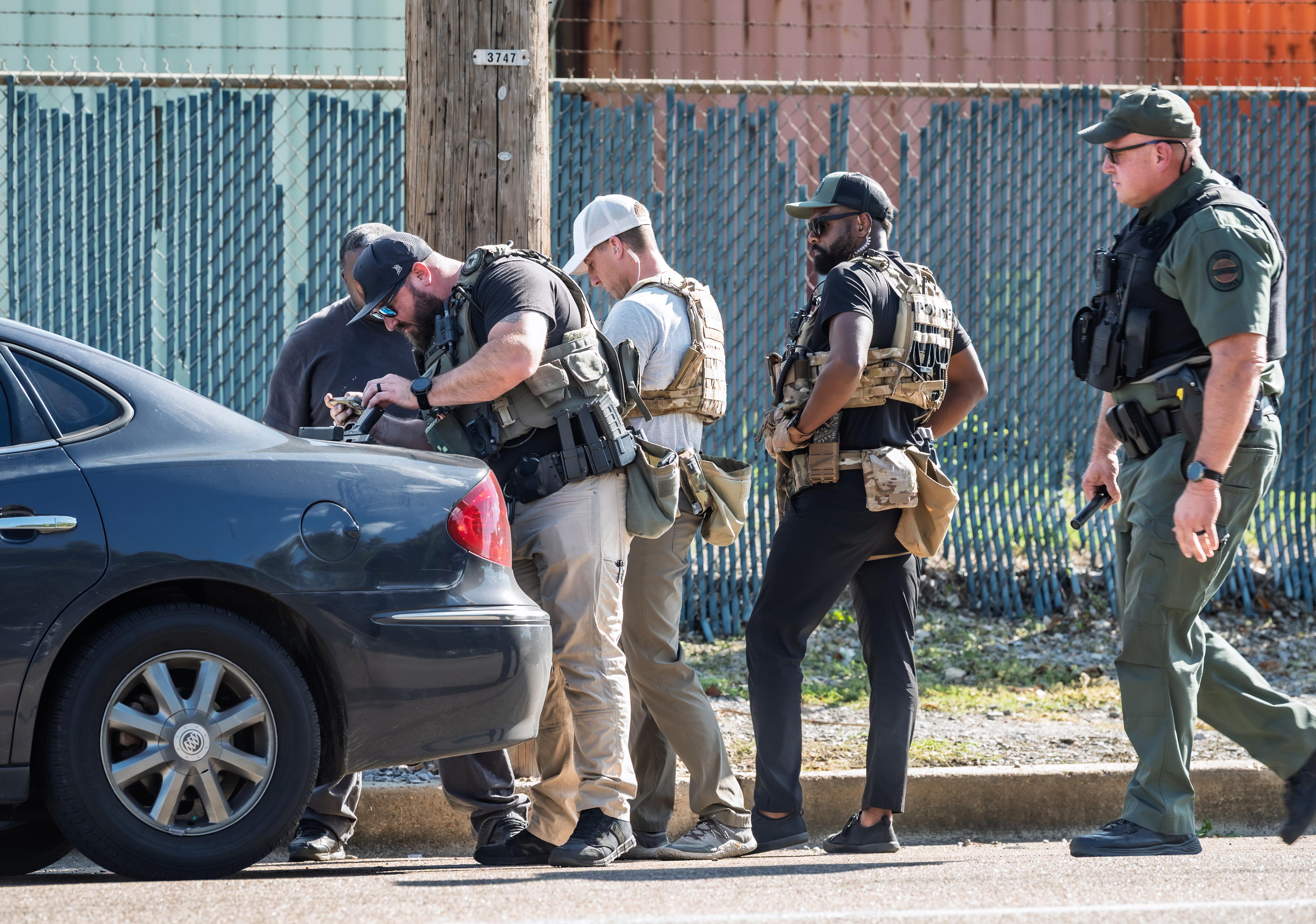







By Dalisia Ballinger TSD Contributing Writer
Natalie McKinney is stepping into one of the most high-profile roles in Memphis education at a moment defined by controversy and change. On Tuesday, Sept 30, the Memphis-Shelby County Schools Board of Education elected her as its new chair, a decision that both reflected and deepened the divisions that have shaped the district since the removal of Superintendent Marie Feagins earlier this year.

Not all members agreed with Tuesday’s outcome.
Amber Huett-Garcia, who opposed Feagins’ ouster, was nominated for both leadership positions and received three votes for chair and four for vice chair.
decision is just not right.”
McKinney insists, however, that the board is moving forward with a new mindset. As chair of the district’s facilities committee, she has already been leading work on a plan to address $1.6 billion in deferred maintenance over the next decade. That effort recently led MSCS leaders to propose closing four schools and transferring a fifth to a neighboring district.
POSTMASTER: Send address changes to The Tri-State Defender, 1509 Madison Ave., Memphis, TN, 38104.
INFORMATION: Inquiries may be submitted in writing or by calling (901) 523-1818 or by email. TELEPHONE: (901) 523-1818.
The Tri-State Defender (USPS 780-220) is published weekly. The Tri-State Defender 1509 Madison Ave. Memphis, TN, 38104. Second-class postage paid in Memphis, TN.
McKinney secured six votes to lead the board through the 2025–26 school year. Every vote in her favor came from members who backed Feagins’ ouster in January. Former chair Joyce Dorse Coleman, who also supported the decision, was elected vice chair.
The board did not mention Feagins during the meeting, but the former superintendent’s departure loomed large. Several members spoke about past mistakes that cost the public’s trust, underscoring the fractures that remain.
“We’ve been in a challenging time, and there are even more issues on the horizon,” McKinney said after being elected. “We’re working to rebuild the district, focusing on student achievement and support.”
That rebuilding will not come easily. The board is contending with a $6 million audit, potential school closures, and the likelihood of a new superintendent search this summer. At the same time, Tennessee lawmakers continue to push for a state-appointed board to assume control of the district, citing the turmoil surrounding Feagins’ removal as part of their justification.
Local government leaders have also turned up the pressure. Just last week, the Shelby County Commission voted to put all nine school board seats on the ballot in 2026, cutting five members’ terms short, including McKinney’s. Four of those shortened terms belong to members who voted to dismiss Feagins.
Before the vote, she told colleagues she was the best candidate to “rebuild trust” and urged them to embrace “fresh leadership.”
Board member Michelle McKissack supported Huett-Garcia and expressed frustration as she left the meeting early.
“All that’s old is new again; we’ve just restored it,” she told reporters. “The
She says the community engagement around those proposals should be a model for how the board operates going forward.
“I want to make sure that we commit to codifying that, making it part of our DNA,” McKinney said. “That is something that the board, no matter who’s sitting in these seats, should be doing on a consistent basis.”


Aligning business investment with nonprofits can build opportunities to chart a path forward that far outlasts the presence of troops on Memphis streets.
By Judith Black Moore TSD Contributing Writer
The sight of the National Guard on Memphis streets is meant to send one clear message: be afraid. Fear makes us reactive. Fear drains our energy in battles we cannot win. But rather than drown in panic, this is the moment for philanthropy to buy a path forward.
That path begins with a truth the headlines miss. Memphis is not incidental. It is essential. Billion-dollar opportunities are growing here — Ford’s Blue Oval, FedEx’s global operations, AutoZone’s headquarters and now a supercomputer said to be one of the most powerful in the world. These investments tell a story the images of armed troops may hide: Investors envision Memphis as potentially central to the nation’s economy and its future.
That makes what happens in our neighborhoods more urgent than ever. While we work to ensure young people are not unjustly swept up by the National Guard, we must also ensure they have a fair chance of seizing the opportunities ahead. Protecting their safety today without securing their place in the future does both them and Memphis a disservice.
Philanthropists must view nonprofits as the infrastructure of a thriving community. Buying a path forward in today’s climate means investing now in organizations like JIFF (Juvenile Inter-
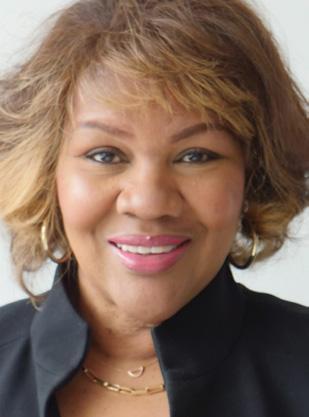
vention & FaithBased Follow-Up), securing their programs, anchoring their operations and amplifying their reach. It means making sure that as wealth flows into Memphis, historically underinvested communities share in the profit.
Chris Yancy, who became executive director of JIFF in February, has made it his mission to move faster than fear.
“JIFF’s mission is to break the destructive cycle of juvenile crime through Christ-centered intervention,” Yancy said. “Historically, JIFF has received most of our youth through juvenile court referrals. That got me thinking about how we could possibly move the needle even more if we were to intervene and mentor these youth before they become a part of the juvenile justice system?”
The expected deployment of troops has only heightened that urgency. “The National Guard deployment is inevitable and requires a sense of urgency, and our strategy should reflect that,” Yancy said.
“We should be connecting more with school counselors, social workers and truancy officers. Churches have deep roots in the community and can be powerful allies for us. Neighborhood associations and community leaders have their fingers on the pulse of
neighborhoods,” he added. “Volunteer programs like our Live Life Together (LLT) program effectively match youth with adults that offer much needed guidance. We also need to continue building collaborations with local businesses and partnerships with other youth-focused nonprofits.”
From prevention to partnership
Yancy argues that prevention is more powerful than detention. “While detention alternatives for youth who are already in the system are a vast improvement over secure confinement, the most effective strategy is to reach our youth before they ever have contact with the juvenile justice system,” he said. “Detention can be a traumatic experience. Interventions that keep youth out of detention centers altogether are less likely to intensify existing trauma and more likely to promote healthy development.”
That vision includes formal diversion protocols — officers referring youth who commit low-level offenses to JIFF instead of arresting them, and memorandums of understanding with schools so teachers and counselors can formally refer struggling students.
The approach has already shown results. JIFF reports a 65 percent success rate for youth who complete its case mentoring program.
“Engaging in drumming circles with Dr. Gregory Washington with the Center for the Advancement of Youth Development at the University of Memphis or engaging in art therapy sessions with the Memphis Brooks Museum of
Art have helped open new opportunities for our youth,” Yancy explains. “The more meaningful and stimulating partnerships that we nurture, the more opportunities for growth in our youth.”
If organizations doing work like JIFF were well resourced according to Yancy, “There wouldn’t be any reason that anyone could give for the National Guard to be deployed in my hometown. With more resources services could be more accessible to a larger number of youth in different neighborhoods including those in rural areas. Investing in preventative approaches saves money, reduces harm and sets young people on a path that leads to long-term success.”
Troops may walk the streets, but Memphis’ future depends on who walks beside its children. Pairing investments in plants, data centers and logistics hubs with investments in nonprofits like JIFF ensures Memphians are not left out of the prosperity developing in their own backyard. Philanthropy can choose to lead Memphis down a path that includes intentional investments in the future – investments that safeguard our youth, offer them transformative resources and ensure every child is positioned to seize the opportunities ahead.
For more information about JIFF, visit www.jiffyouth.org.
Judith Black Moore is a nonprofit strategist and co-founder of the Tarik Black Foundation. She coaches leaders to build stronger, more impactful organizations.
By Dalisia Ballinger TSD Contributing Writer
Leaders from the NAACP Memphis Branch and a coalition of community organizations convened Friday, Oct. 3, at the NAACP headquarters to denounce the deployment of the National Guard, U.S. Marshals Service and other state and federal agencies in Memphis. Speakers described the presence as an “occupation” that threatens civil liberties and community trust.
Kermit Moore, NAACP Memphis Branch president, opened the news conference with sharp criticism of the federal crime fighting actions.
“The federal occupation of Memphis is unnecessary, unwarranted and it must end. Our city is not a military training ground,” Moore said. “Over the past two years, crime in Memphis has dropped by double digits. So we have to ask, why here? Why now?”
Moore argued that the millions spent on federal deployment would be better invested in education, housing and workforce development.
“This is how you build safe and strong communities. Instead, we are being used as pawns in a political game,” he said. “We demand investment, not occupation. We demand progress, not politics.”
Gail Jones Carson, president of the Memphis Urban League and second vice president of the NAACP Memphis Branch, emphasized the need to protect citizens while acknowledging the heightened risks of potential unrest.

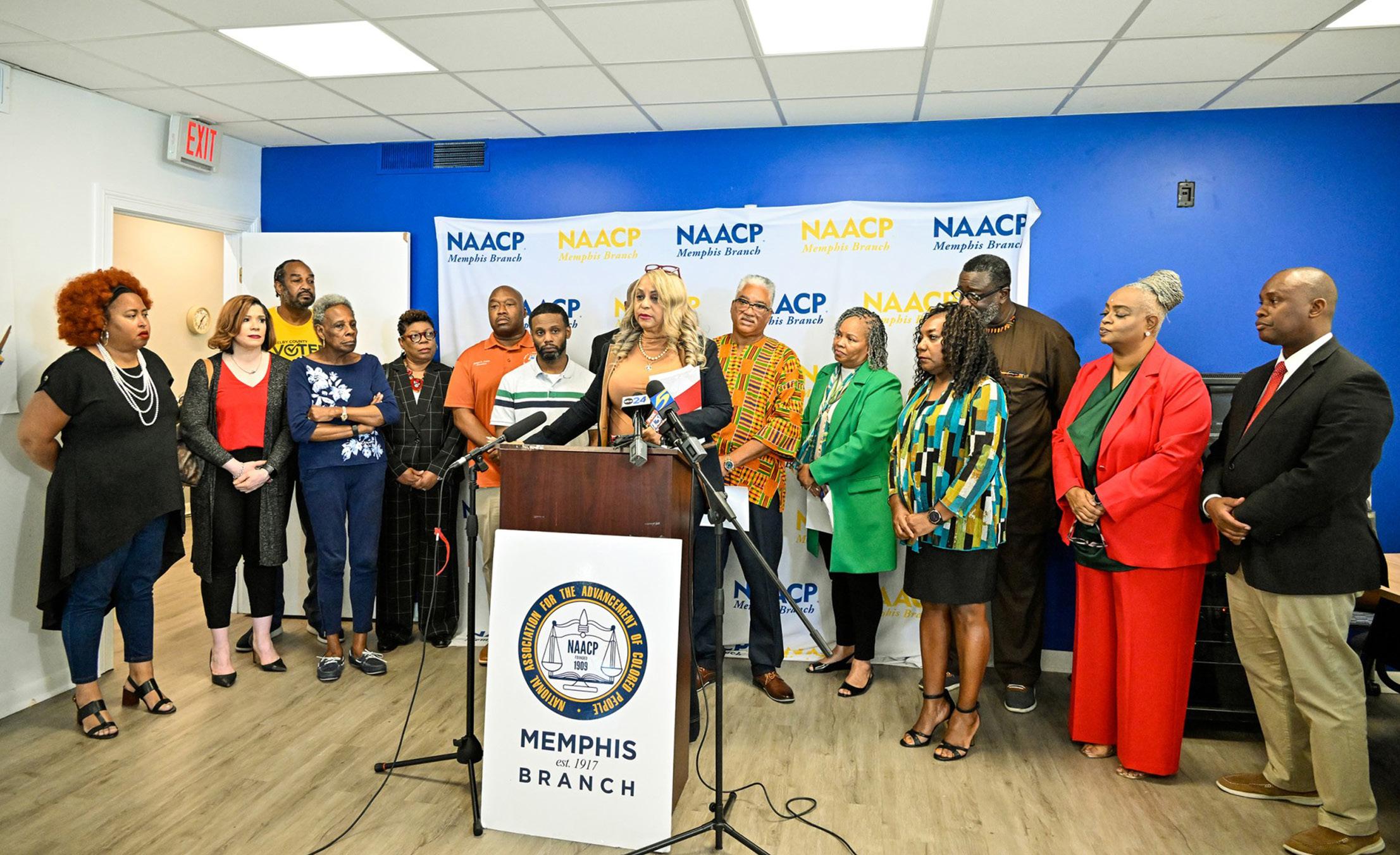
“We don’t want our city up in flames. We don’t want people fighting, but we also must take responsibility for our actions,” Carson said. “You can be right, but you can also end up in jail or worse. That’s why we are providing resources on how to handle encounters with law enforcement.”
She pointed to the Urban League’s website, memul.org, which offers guidance for city residents on their rights when interacting with law enforcers; safety protocols; and what to do if arrested.
Deidre Malone, president of the National Women’s Political Caucus and first vice president of the NAACP Memphis Branch, announced the launch of a new initiative called Defending Democracy Together on the NAACP Memphis website. The page includes fact sheets, a legal hotline
monitored by Attorney Van Turner and registration for a virtual town hall with Mayor Paul Young and Police Chief C.J. Davis scheduled for Oct. 8. at 3:15 p.m.
“We built this coalition because we know it’s going to take all of us to make sure that black, brown and immigrant communities are educated and not afraid in their own neighborhoods,” Malone said.
Other speakers, including NAACP Executive Director Vickie Terry, raised concerns about reports of aggressive tactics by U.S. Marshals in neighbor-
hoods like Frayser, Whitehaven and Hickory Hill.
“It’s not the National Guard we should fear, it’s the U.S. Marshals and other federal agents who are terrorizing our communities,” Terry said.
The news conference also focused on practical safety steps, from keeping identification documents accessible to exercising caution during police encounters.
“As far as identification of records, everyone needs to renew their driver’s license, tags and insurance,” said Jones-Carson. “Get a passport with the
“We demand investment, not occupation. We demand progress, not politics.”
— Kermit Moore
probate court clerk, Eddie Jones, 140 Adams. Keep birth certificates and social security cards in a safe place. Check for any outstanding warrants. If you’ve got an outstanding warrant, you need to clear it up.”
Ian Randolph, representing the Shelby County Voter Alliance, warned that the deployment could have long-term consequences, including intimidation at the polls.
“In the back of my mind, I’m thinking about what’s going to happen in 2026 when elections start. Are there going to be troops outside the polls under the guise of protecting us?” Randolph asked. “Don’t be scared to vote if you see troops. Start preparing mentally now.”
The coalition vowed to continue mobilizing, educating residents and pressing leaders to redirect resources toward long-term community investment rather than militarization.

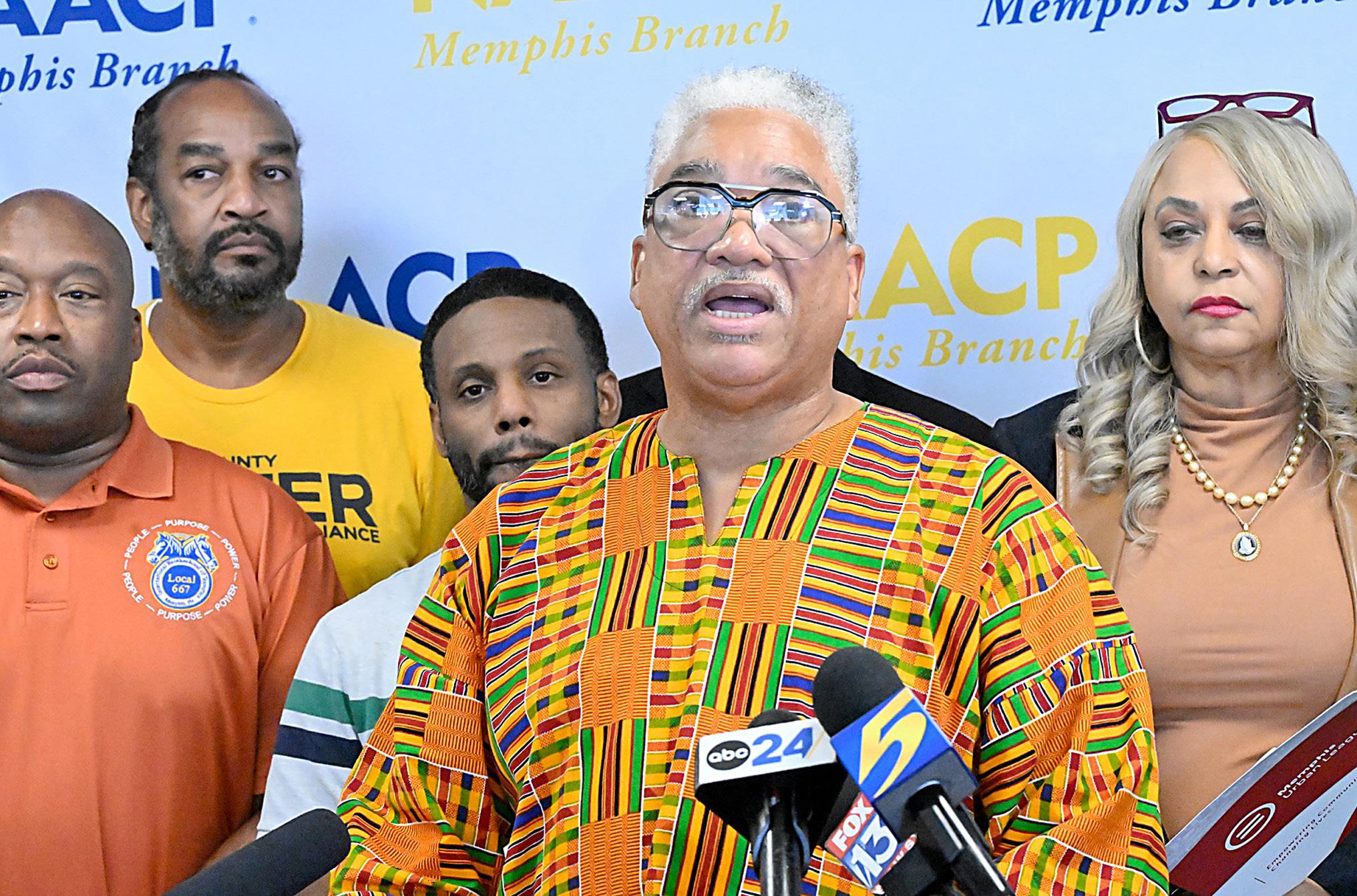

By Dalisia Ballinger TSD Contributing Writer
The sound of jet engines cut across the Memphis sky Wednesday morning as Defense Secretary Pete Hegseth stepped off a plane and into the waiting handshake of Tennessee Gov. Bill Lee. At his side was U.S. Attorney General Pam Bondi, who had already taken to social media to tout the arrival of a new federal crime-fighting surge.
In a Twitter (X) post, Bondi revealed what many in the city had been waiting to hear: Within just two days, the newly formed Memphis Safe Task Force had made more than 50 arrests. Backed by President Donald Trump’s order, the task force blends federal agents with state and local authorities in an effort to push back against Memphis’ persistent violent crime.
On the ground, mobile command centers from the U.S. Marshals Service and the Tennessee Bureau of Investigation now stand at a staging area in Memphis, their doors swinging open to reveal banks of screens and officers coordinating real-time arrests. More than 200 officers, many sworn in just this week, have begun executing warrants and conducting traffic stops alongside the Tennessee Highway Patrol.
The officials’ visit carried both symbolism and force. Supervisory Deputy U.S. Marshal Ryan Guay promised Memphis residents one thing: more enforcement. “You’ll see us serving warrants, especially for violent offend-


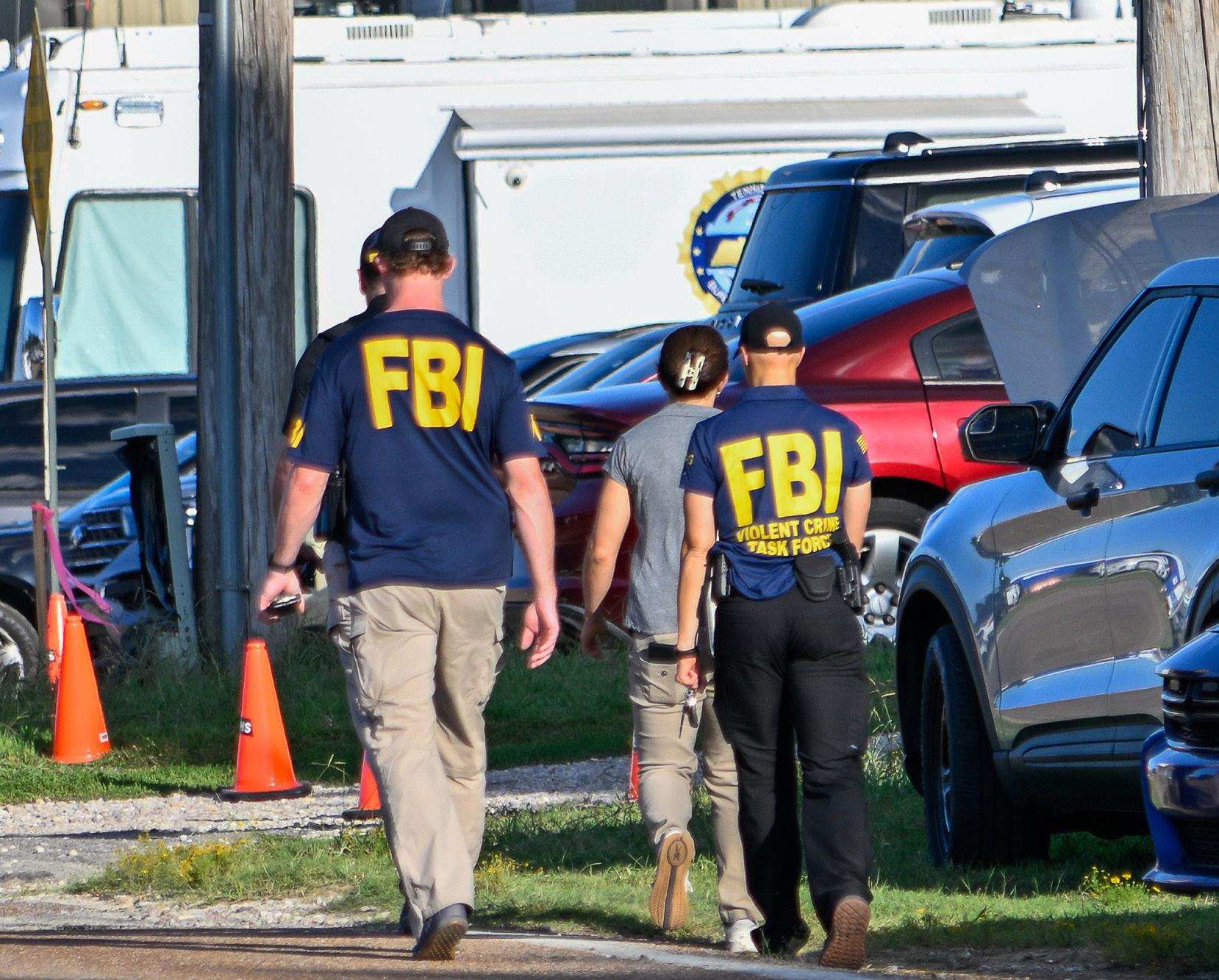
city and liberate all the law-abiding citizens.”
ers,” he said, noting that arrest updates will soon be released to the public.
For Gov. Lee, the mission was about partnership as much as policing. “We are grateful to be a willing partner with these federal agencies,” Lee said. “It’s a great opportunity to revitalize this city.”
He also confirmed that Tennessee National Guard members could be called in, but emphasized they would not be armed or conducting arrests unless specifically requested.
White House Deputy Chief of Staff Stephen Miller was even more direct.
“Every resource we have — federal, state and local — we are going to use to dismantle their networks without apology and without mercy,” he declared.
“Everything we have, we are going to bulldoze the criminal element of this
Mayor Paul Young, who has sought to balance Memphis’ urgent need for public safety with investments in community development, welcomed the support but urged that enforcement not overshadow long-term solutions. “We need resources, yes, but we also need to address the root causes of crime,” Young said, pointing to jobs, education and opportunity as equally critical to making neighborhoods safe.
U.S. Rep. Steve Cohen expressed sharper concerns in a letter sent Wednesday to both Bondi and Hegseth. Cohen said he first learned of their visit through the news media, not through their offices and demanded more transparency about how the task force will actually operate.
“If the real purpose of the Memphis Safety Task Force is public safety, we must be more collaborative,” Cohen wrote. “I implore you to drop the wartime rhetoric and footing. I implore you to listen and respond to Memphians, coordinate with the City and County, communicate with my office
and invest in what has been working. We need long-term solutions, not political photo ops.”
Meanwhile, a show of force by other law enforcement agencies involved in the campaign was on display Wednesday across the city.
Along Shelby Drive Wednesday afternoon, dozens of patrol cars lined the road. Memphis police vehicles idled alongside unmarked federal SUVs and Tennessee Highway Patrol cruisers, and officers were moving in and out of mobile command trailers. At a check point at Chelsea Avenue and McLean Boulevard, drivers were being pulled over. Some vehicles were searched or sniffed by the canine patrols.
Bondi’s arrest numbers, combined with the visible surge of officers, underscored the scale of the federal push. Whether it succeeds in delivering peace or sparks further division, the next chapters will play out not just in courtrooms or press conferences, but in Memphis neighborhoods where families are deciding whether this surge makes their streets feel safer or more uncertain than ever.
By Dalisia Ballinger TSD Contributing Writer
The Memphis Safe Task Force, ordered by President Donald Trump and announced by U.S. Attorney General Pam Bondi, has brought more than 200 federal and state officers into the city. Immigration agents, drug enforcement teams, U.S. Marshals and Tennessee troopers now move alongside Memphis police, carrying out warrants and traffic stops in what officials describe as a coordinated strike against violent crime.
For Bondi, a longtime Trump ally and former Florida attorney general, this moment is an extension of her tough-on-crime reputation. She has built her career around high-profile prosecutions and has often aligned herself with aggressive policing strategies. In Memphis, she wasted no time in pointing to numbers as proof of progress. “More than 50 arrests in two days,” she wrote on social media Tuesday, calling the results “an important first step” in reclaiming neighborhoods from crime.
Gov. Bill Lee, standing alongside Defense Secretary Pete Hegseth and Bondi, cast the operation as a chance to restore confidence in Memphis’ future.
“We are grateful to be a willing partner with these federal agencies,” Lee said. “It’s an opportunity to revitalize the city.”
He confirmed that up to 150 Tennessee National Guard members could be deployed, though he stressed they would not be armed or conducting arrests. “There will be no tanks in Memphis,” he said, attempting to ease residents’ fears of military presence on city streets.
The surge is part of a wider federal initiative that has rolled out in several


U.S. cities, placing an emphasis on violent crime hot spots and coordinated federal-state enforcement.
In Memphis, this means checkpoints along major corridors, sweeps targeting alleged gang activity and collaboration between local police and federal prosecutors to fast-track cases into federal court, where sentences are often harsher. Authorities have also leaned on technology, from license plate readers to expanded surveillance networks, to map movement in and out of targeted neighborhoods.
Federal officials point to Memphis’ crime statistics as justification for the city’s inclusion. In recent years, Memphis has consistently ranked among the nation’s most violent metropolitan areas,
with high per-capita homicide and aggravated assault rates, though its overall crime numbers have been down this year. Bondi and Lee both framed the effort in moral terms — a mission not only to arrest criminals but to restore peace of mind to residents.
Yet for some, like Angela White, a nurse who works night shifts downtown, the reality is more complicated. “I hate seeing blue lights in my rearview mirror,” she said. “But if those lights mean I make it home safe, then maybe it’s worth it.”
But in majority-Black neighborhoods such as Whitehaven and Frayser, where the task force has concentrated its presence, the surge feels less like safety and more like surveillance. Residents
report streets lined with patrol cars, checkpoints set up without warning and deputies pulling over multiple drivers within minutes. In some cases, three officers have surrounded a single person during a stop.
“Every corner I turn, it’s flashing lights,” said Darrell Johnson, a Frayser resident. “They say it’s about stopping crime, but it feels like they’re stopping us.”
At Bondi’s media event yesterday, a Trump supporter voiced a different perspective, cheering the National Guard and federal presence. “I’m tired of putting my daughter to bed to the sound of gunshots,” he said. “I’m happy because it’s like a relief. I hope they stay for as long as they need to and never leave.”

The National Civil Rights Museum’s new BlueCross Healthy Place is a common ground for people of all backgrounds to gather, heal and imagine a better future.
By Judith Black Moore TSD Contributing Writer
The National Civil Rights Museum expanded its mission beyond its walls Saturday with the opening of Founders Park, a new BlueCross Healthy Place. Museum leaders, city and state officials, and representatives from BlueCross BlueShield of Tennessee stood before the crowd to mark a milestone of collaboration where the museum’s legacy, corporate partnership and community vision intersected to create a space devoted to physical and mental well-being.
“Every season brings new reasons for people to come together and talk about how to build a better future,” said BlueCross spokesperson John Hawbaker. “That’s one of the reasons we’ve been proud from the very beginning to work with the museum.”
Before the ribbon was cut, children from the community gathered around the stage in a symbolic reminder of the next generation who will one day shape the conversations that happen in this space.
As the ribbon fell, Kool & The Gang’s “Celebrate” signaled it was time to enjoy the park. Across the grounds, visitors joined in line dancing, eating, exploring and walking up the steps to the Legacy Terrace for a view of Room 306, the balcony where Dr. Martin Luther King Jr. lost his life.
“It’s an incredible view,” said Hawbaker. “When we began this journey, we knew this space had to honor the past while inviting reflection on what it means to build a better community. That’s what Founders Park represents.”
The park, one of 28 BlueCross Healthy Places across Tennessee and one of three in Memphis, offers an outdoor sanctuary for movement, mind-
fulness and meaning.
For Erica Griggs, a museum member, the opening felt like a full-circle moment. “I was here for the groundbreaking,” she said. “So often there are announcements about what’s coming and then things stop. I needed to see with my own eyes what they actually did. And it’s good to see this really happen.”
But for Griggs, joy is tempered by reflection. “In light of the occupation happening in the city this week, this opening is bittersweet,” she said, referring to local protests and the heightened presence of state and federal law enforcement and the National Guard in the city as part of the Memphis Safe Task Force.
“Fifty-some years ago, the National Guard was here after Dr. King was assassinated. To be here today celebrating this beautiful park and to think about that is another example of the bittersweet, which is so much a part of Memphis’ history. But it’s what makes opening this space so important,” Griggs added.
Nearby, Maurio Walker sat with his children, eating popsicles and playing on Legacy Terrace. “I wanted my kids to feel what it’s like to be a part of a community, to be part of something powerful like this opening,” Walker said.
“I told my kids about the significance of this place and that even though something tragic happened here, out of it we rise,” he stated. “We need something positive happening right now, and we should enjoy it.”
Among the crowd, few stories captured the spirit of the day like that of Antonio Tirado, the architectural project manager for the park.
His journey began generations earlier when his mother left Mexico. One of nine children, she arrived in Memphis

seeking greater opportunities. “My mother came here because she wanted her children to have a better life,” he said. “She worked hard so that I could get a good education for myself.”
Tirado was born in Memphis and became the first in his family to graduate from middle school, high school and college. As a boy, he often visited the National Civil Rights Museum, never imagining he would one day help shape the space surrounding it.
“I thought I was going to be a mason laying bricks like my father,” he said. “When he introduced me to architecture, I realized it was another way to stay with the business, but I could be the one designing the buildings, and I thought that was a really good thing.”
That realization led him to the University of Memphis, where he earned his master’s degree in architecture. He
joined Self+Tucker Architects, the firm that designed Founders Park.
“Seven years later, I had the opportunity to be the project manager for this project,” he said while looking across Legacy Terrace at his mother and family enjoying the park he helped create.
Tirado sees Founders Park as a testament to his heritage, his family’s perseverance and his mother’s dream.
“This park is important for the Latino community,” he said. “It’s a safe space for us to gather and for people to voice their opinions. For me, standing here today means everything.”
From the Legacy Terrace to the open lawns, Founders Park stands as a reminder that healing and progress often begin in shared spaces where people of different backgrounds can reflect on how to build the future Dr. King and others envisioned.

By Terri Schlichenmeyer
Face it: Some scores can never truly be settled.
You can try tit-for-tat. You can scheme and plan. But making things even? Not a chance. The other guy is probably scheming, too, so full payback ain’t happenin’. And besides, why let revenge live in your head? Life’s too short. You just can’t do it, and especially, as in the new book “A Thousand Ways to Die” by Trymaine Lee, you can’t do it with a gun.
Eight years ago, Trymaine Lee almost died.
Fortunately, the blood clot in his body, the “widow-maker,” was caught in time, but the whole episode affected his then young daughter, who continued for some time to beg for stories about it and to ask about life and death.
Lee didn’t always know what to say.
“I struggle,” he says, “to answer why things are the way that they are, especially when it comes to Black folks like us.”
Death by violence happened in his own family. In 1923, a young great-uncle left on horseback to run an errand and was never seen alive again. It “ripped a hole in the family” that resonated for generations. Lynchings were common then as was Jim Crow, and so “Black folks… began leaving the South en masse…”
Guns, he says, were “central to the violence” then, on both sides. Violence followed Black soldiers to Vietnam and home again. It went to
prison with some people, most often, men. Lee himself almost got in trouble once for a “twelve-dollar toy gun from Walmart” that looked realistic.
Black funeral directors learned how to hold open-casket funerals, as death stalked Black Americans for not learning to swim because Jim Crow kept them from it. Cancer caught others in unequal numbers. Some were wrapped up in “the deadly grind of the drug trade,” while “innocent victims [are] caught in the cross fire.”
“We still bleed,” he says. “… yet salvation from America’s violence has remained out of our grasp, like trying to put shape to the wind.”
On the surface, you might think there’s not much new to say about violence, when talking about Black life in general. In many ways, it’s been a part of American life for so long, it’s almost some sort of wrong-headed new normal. And yet, read “A Thousand Ways to Die” and your thinking is going to twist and twist again in a whole new direction.
While author Trymaine Lee’s main focus is on gun violence in the past century or so, he diverts readers’ attention sometimes. Don’t forget this. Remember that. Here’s a story for you. Here’s something else. As Lee totes them up, one by one, each point shows hidden costs attached to violent acts.
Readers will be hit hard by the fact that it’s a long list.
This is the kind of book that your mind will carry with you for days. It’s a powerful book that begs to be shared and discussed.

“A Thousand Ways to Die: The True Cost of Violence On Black Life in America” by Trymaine Lee
c.2025, St. Martin’s Press
$29.00
257 pages


By Eric Olson Associated Press
Tennessee, Vanderbilt and Memphis are no strangers to The Associated Press college football poll. Until now, the three schools from the Volunteer State had never been ranked in the Top 25 together.
Memphis is the first Bowl Subdivision team to go 6-0 and achieve bowl eligibility, and Sunday the Tigers received their first ranking of the season at No. 23.
“Hopefully we continue to win football games, and hopefully there continues to be positive headlines about this group and about this program,” sixth-year coach Ryan Silvefield said. “We want to continue to see that leaping Tiger, that Memphis logo, on national television week after week and people talking about us in a positive light — not only about this athletic department, this football program but our great city.”
The Tigers, who won 34 games over four seasons with Seth Henigan at quarterback, have rallied around Brendon Lewis and are among the front-runners for the Group of Five bid in the College Football Playoff. Lewis, who transferred from Nevada, leads an offense averaging 40.5 points per game to rank second in the American Conference and 450 yards per game to rank third.
Memphis’ season highlight so far is its 32–31 win over Arkansas in a game in which it trailed by 18 points in the second quarter. The Tigers have lopsided wins over Florida Atlantic and Tulsa since. Their toughest remaining games, against No. 24 South Florida and Tulane, are at home.
No. 12 Tennessee, the state’s flagship institution, has appeared in at least one poll in all but eight seasons since 1985. They’ve been absent in only two polls since the start of the 2022 season, and their 642 total weeks as a ranked team are 13th-most.
The Vols (4-1) go into this week’s home game against Arkansas with the nation’s top scoring offense, at 51 points per game. They’ve scored over 40 points in five consecutive games for the first time. Their four defensive touchdowns lead the Southeastern Conference and rank second in the FBS.
No. 20 Vanderbilt, anchored at the bottom of the Southeastern Conference for most of its football history, appeared in only seven polls from 1959–2023. The Commodores were ranked two weeks last year, and Sunday were in a fourth straight poll, a school record.
The Commodores, coming off a 30–14 loss at now-No. 8 Alabama, are 5-1 and off to their best start since 2008. Their next game is at home Oct. 18 against No. 11 LSU.
Middle Tennessee, the state’s other FBS program, has never been ranked in its three decades in the FBS. Tennessee is among 13 states that have had at least three teams ranked simultaneously over the 89-year history of the poll.
IN THE CHANCERY COURT OF TENNESSEE FOR THE THIRTIETH JUDICIAL DISTRICT AT MEMPHIS, SHELBY COUNTY TENNESSEE, In its own behalf and for the use and benefit if applicable, THE STATE OF TENNESSEE and, THE MUNICIPALITIES OF ARLINGTON, BARTLETT, COLLIERVILLE, GERMANTOWN, LAKELAND, MEMPHIS AND MILLINGTON TENNESSEE
Plaintiffs, vs. DELINQUENT TAXPAYERS as shown on the 2022 Real Property Tax Records of the Shelby County Trustee and the United States of America, Defendant(s)
TX-2024-2
Tax Sale 2202
Order of Publication:
In this cause, it appearing from the Affidavit of Service of Process and Request for Service of Publication filed in this cause on September 16, 2025, that all of the named Defendants listed below as ‘Exhibit A’ are Not To Be Found. Further the Plaintiffs conducted a diligent search and inquiry and were unable to locate any of the Defendants in ‘Exhibit A’ that were not to be found. Therefore, such persons should be notified by publication that they are required to appear on December 04, 2025 before Chancellor James R. Newsom, Part II of Chancery Court in the Shelby County Courthouse, 140 Adams Avenue 3rd Floor, Memphis, Tennessee. Such persons should also be notified of the need to file on or before December 04, 2025, an answer making defense to the bill filed against them in said Court by Shelby County, or otherwise a default judgment will be taken against each defendant herein named. The purpose for which the defendants are to appear is to defend against certainconsolidated suits filed to enforce real estate tax liens for delinquent real estate taxes due and owing on real estate in Shelby County and if applicable the City of Memphis and the Incorporated Municipalities of Arlington, Bartlett, Collierville, Germantown, Lakeland, Memphis, and Millington Tennessee. If any of the defendants named herein do not file an answer, on or before Friday December 04, 2025 a Motion for Default Judgement will be heard at 9:00 a.m. in Part II of Chancery Court, 140 Adams Avenue, 3rd Floor, Memphis, TN. If you wish to discuss alternatives, if any, to the sale of your property, currently have an active bankruptcy, or if you have any questions, please call (901) 222-0200. The properties of the Defendants named herein are scheduled for Tax Sale 2202; TX-2024-2. The sale is scheduled for April 07, 2026 via online auction beginning at 8:00 a.m. at ZeusAuction.com.
IT IS FURTHER ORDERED that this notice be published once each week for four (4) consecutive weeks on October 03, 2025; October 10, 2025; October 17, 2025; and October 24, 2025 In the Daily News.
Signed, James R. Newsom, Part II
Shelby County Government has issued Sealed Bid number I000949, FY 2026 State-Aid Asphalt Paving Project. Information regarding this Bid is located on the County’s website at www.shelbycountytn.gov . At the top of the home page, click on the dropdown box under “Business”, Click on “Purchasing” and “Bids” to
1509 Madison Ave. Memphis, TN 38104
PH (901) 523-1818
HOURS: Mon.-Fri. 9 a.m. - 5 p.m.
Display ads Friday 5 p.m. Classifieds ads Monday 5 p.m.
STANDARD RATES: $8.00 per line for 1 column ad.
Rates are non-commissionable and are quoted at the net rate. No refund for early cancellation. For additional information contact Sales Dept. at (901) 746-5201 or email: advertising@tsdmemphis.com.
GENERAL INFORMATION:
The Tri-State Defender reserves the right to edit all copy or to reject or cancel any ad at any time. Copy change during ordered schedule constitutes new ad & new changes. Deadlines for cancellation are identical to placement deadlines. Rates subject to change. We can only offer in-house credit and NO REFUNDS are issued.
THE TRI-STATE DEFENDER assumes no financial responsibility for errors nor for copy omission. Direct any classified billing inquires to (901) 523-1818.
locate the name of the above-described Sealed Bid.
SEALED BID I000949 DUE DATE THURSDAY, NOVEMBER 6, 2025 @ 2:30 PM CST
(SB-I000949) FY 2026 State-Aid Asphalt Paving Project
Shelby County is an equal opportunity affirmative action employer, drug-free with policies of non-discrimination on the basis of race, sex, religion, color, national or ethnic origin, age, disability or military service.
By order of LEE HARRIS, MAYOR SHELBY COUNTY GOVERNMENT
Shelby County Government has issued Sealed Bid number I000948, Crime Scene Vehicle. Information regarding this Bid is located on
the County’s website at www.shelbycountytn. gov . At the top of the home page, click on the dropdown box under “Business”, Click on “Purchasing” and “Bids” to locate the name of the above-described Sealed Bid.
SEALED BID-I000948 DUE DATE WEDNESDAY, NOVEMBER 5, 2025 AT 2:00 PM CDT
(SB-I000948), CRIME SCENE VEHICLE
All bids will be opened and read via teleconference by Shelby County Government at the time mentioned above. Please use the flowing information to join the bid opening, MICROSOFT TEAMS
Join the meeting now Meeting ID 250 297 236 059 9 Passcode: xW9FP2jj
Shelby County is an equal opportunity affirmative action employer, drug-free with policies of non-discrimination on the basis of race, sex, religion, color, national or ethnic origin, age, disability or military service.
By order of
LEE HARRIS, MAYOR SHELBY COUNTY GOVERNMENT
NOTICE TO BIDDERS
Shelby County Government has issued Request for Qualifications number 26-010-61, On-Call
Pedestrian and Bicycle Planning Services for the Division of Planning & Development (DPD), Memphis Urban Area Metropolitan Planning Organization (MPO). Information regarding this Bid is located on the County’s website at www.shelbycountytn.gov . At the top of the home page, click on the dropdown box under “Business”, Click on “Purchasing” and “Bids” to locate the name of the above-described Sealed Bid.
RFQ 26-010-61 DUE DATE MONDAY, NOVEMBER 10, 2025 @ 2:00 PM (CDT)
(RFQ 26-010-61) ON-CALL PEDESTRIAN AND BICYCLE PLANNING SERVICES
(Division of Planning and Development (DPD), Memphis Urban Area Metropolitan Planning Organization (MPO)).
Shelby County is an equal opportunity affirmative action employer, drug-free with policies of non-discrimination on the basis of race, sex, religion, color, national or ethnic origin, age, disability or military service.
By order of
LEE HARRIS, MAYOR
SHELBY COUNTY GOVERNMENT


By Gene Columbus Special to The Tri-State Defender
For many entrepreneurs, fall marks a key transition point that can set the tone for year-end performance. It’s a crucial time for business owners to assess their finances and prepare to capitalize on upcoming opportunities and new cycles of customer engagement. Some businesses may see an influx of traffic during the fall and winter, especially during the holidays. For those that experience a natural slowdown as the temperatures drop, it’s an ideal time to refine strategies and set the stage for future peaks. Either way, the seasonal transition provides an opportunity to maximize the last part of the year.
In Memphis, fall ushers in both opportunities and challenges for entrepreneurs. Major events like the Cooper-Young Festival, Southern Heritage Classic and the start of the Memphis Tigers football season draw visitors and boost traffic for local retailers, restaurants and hospitality businesses. At the same time, the return of college students to the University of Memphis, LeMoyne-Owen College, Christian Brothers University, Rhodes College and Southwest Tennessee Community College increases demand in dining, housing and retail. For businesses that rely on seasonal tourism or holiday shopping at Wolfchase Galleria, Tanger Outlets and neighborhood districts like Overton Square or South Main, this is a pivotal time to prepare for shifting customer patterns and maximize year-end performance.
To ensure success, here are some tips to help businesses optimize cash flow,
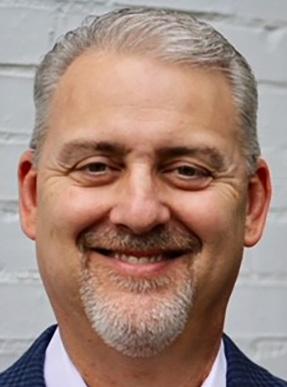
manage inventory and make data-driven decisions.
Cash is king, and business owners need to meticulously manage and monitor its flow to finish the year strong. This fall, business owners can do so by:
• Forecasting budget: For businesses in certain sectors — think tourism and hospitality — cash flow is susceptible to feast-or-famine cycles. Peak summer and winter seasons may bring in a wave of customers and, therefore, substantial revenue, which leaves a potential lull during the fall months. Over-indexing on periods of high demand can lead to budgets that become hard to sustain during quiet periods. To shield the business, build potential revenue dips — whether due to slower customer activity or seasonal demand shifts — into your budget.
• Negotiating with suppliers: If there are any new suppliers you will be working with in the fall months or agreements up for renewal, plan to negotiate those vendor contracts as appropriate. Ask for extended payment terms, discounts for early payment or volume discounts. If you can’t come to an agreement, don’t be afraid to shop around for better deals and partners.
• Accelerating receivables when possible: Look for ways to incentivize customers to make early payments. For example, you might offer a limited-time fall discount to customers who pay by a certain date. You can also stay on top of receivables by invoicing promptly, and don’t be afraid to follow up on late
payments.
• Proactively exploring financing options: Don’t wait until you’re in a Q4 cash crunch to seek financing. If you don’t have an existing relationship with a bank or credit union, start off fall right by establishing one. A line of credit can be a valuable safety net toward the end of the year.
Optimize inventory for fall demand
Business owners should examine physical inventories and adjust as needed to streamline for the fall months. By strategically optimizing inventory, they can more confidently navigate fluctuating demand, avoid costly overstocks and ensure customer needs are met. Some tactics to manage inventory include:
• Analyzing sales data and adjusting: Consult historical sales data to identify your best- and worst-selling products during the fall months. By understanding proven demand patterns, you’ll be able to make more informed decisions about which products to stock up on and which can be moved off the shelves.
• Implementing just-in-time inventory: If possible, work with suppliers to implement a just-in-time inventory system to receive items when you truly need them. This will help minimize storage costs and the risk of overstock, allowing you to capture sales opportunities while maintaining leaner operations.
• Considering seasonal promotions: As we move into fall, run promotions to clear out excess seasonal inventory and create more space for new fall arrivals.
Think like a CFO
Every season, business owners should use data to identify trends in
customers’ behavior, forecast revenues and plan ahead. Business owners can start by looking at the past three to five fall seasons and determining the specific revenue dips and expense spikes. From there, it is crucial to identify the why behind these numbers. Having a deep understanding of performance metrics will help entrepreneurs better prepare for the future. To do this, start by:
• Segmenting your customer base: Understand which customer segments are most active in the fall and tailor your offerings to them. Are locals more likely to spend, or are you reliant on tourists? These considerations can better inform marketing messaging and spending.
• Developing and tracking key performance indicators (KPIs): While overall revenue is important, you should be using a variety of metrics to measure the success of your business. Track KPIs like customer acquisition cost, average transaction value and website traffic, which provide insights into your current performance and enable you to identify growth pathways, pinpoint optimization opportunities and accelerate your progress toward goals.
Owning a business is a rewarding but challenging vocation. A crucial element of success lies in effectively managing fluctuating consumer needs and costs as the seasons change. By taking proactive steps through the fall months, you can set your business up to thrive in the final quarter of the year.
Gene Columbus is senior vice president of Business Banking for Bank of America Memphis.